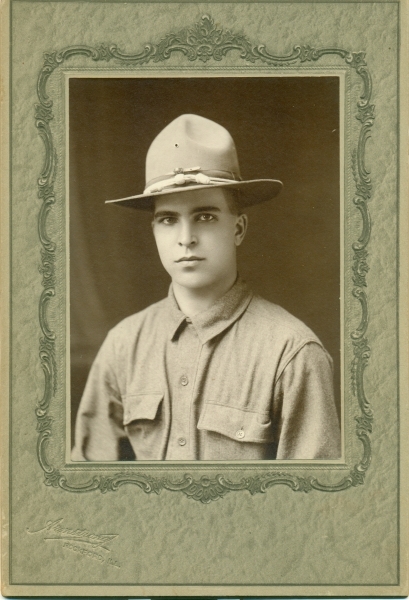
From 1919 to 1921 A. R. McElwain was elected as Commander
Legend has it that the old adage, "Looks like he's at death's door," was coined in a base hospital surgical ward in Orleans, France, during World War I. Many have forgotten, but a world-wide pandemic in 1918-19, labeled Spanish flu, killed nearly as many soldiers as the war. It also killed millions of civilians.
Accounts from that time stated that the surgical ward was long and narrow and the sickest patients were at one end near a door. Those who died were taken out through that door, hence the expression, "At death's door." The story was that the sicker someone got, the closer their bed would be pushed toward "Death's Door."
Allen R. McElwain, the man who later became the first commander of Marion, Iowa, American Legion Post 298, was in that hospital ward on Nov. 3, 1918, with the Spanish flu. McElwain was "three beds from death's door'' when he began to get better and eventually recovered, said McElwain's Granddaughter, Anita Clark, 64, of Mount Vernon. McElwain was shipped home in early 1919 and later mustered out of the service at Camp Dodge in Des Moines. He returned home to Marion during the summer of 1919.
McElwain was "lucky." By the War Department's most conservative count, influenza sickened 26% of the Army—more than one million men—and killed almost 30,000 before they even got to France. On both sides of the Atlantic, the Army lost a staggering 8,743,102 days to influenza among enlisted men in 1918. The Navy recorded 5,027 deaths and more than 106,000 hospital admissions for influenza and pneumonia out of 600,000 men - and a large number of mild cases were never recorded,
More American soldiers, sailors, and Marines succumbed to influenza and pneumonia than died on the industrialized battlefields of the Great War. World-wide, estimates ranged from 50 million to 100 million people as dying from the influenza, dubbed Spanish flu in 1918-19.
McElwain, who was born Dec. 21, 1895, in Chicago. to Mr. & Mrs. G. W. McElwain, graduated from Marion High School in 1914. He joined the U.S. Army in 1917, with his brother Harold. Allen served with the forestry branch of the army. Clark is unsure if her grandfather saw combat before being felled by the flu.
"He didn't talk about it (the war) too much - not in front of me any way. He would try to answer questions,'' Clark recalled.
She remembers as a child, seeing an indentation in her grandfather's back and learned it was from draining fluid from his lungs during his flu treatment.
On Sept.14,1920. McElwain married Bess Helbig. They had one child, a daughter, Kathryn, who was born at home in 1921. She was Anita Clark's mother. She died in 2008. Allen died at age 73 on Sept. 29, 1969.
Clark described McElwain as about 5-feet-11-inches tall, and said he was of "stocky" build later. McElwain worked at Penick & Ford Co., retiring in 1954. For much of his life, McElwain lived at 848 8th ave., close to down town Marion.
Allen and a few other WWI veterans started the American Legion in Marion, with Allen becoming the first post commander. The post formation began on Nov.19, 1919, at a meeting in the WRC Hall in Marion. Of the 40 at the meeting, McElwain was in elected chairman. A constitution and by-laws were drawn up. On Dec. 7th, a charter was signed by 14 members.
In addition to being the first Post Commander, and later a District Commander, Allen was Post Adjutant for more than 30 years. He attended the National Convention in 1933, at Chicago, and in 1936, in Cleveland. McElwain also belonged to the Marion Masonic Lodge #6, AF & AM (Ancient Free & Accepter Masons), Marion chapter #6, R.A.M. & Apollo Commandery #26, K.T., Commander of the Knights Templer, El Kahir Shrine and Patron Marion Chapter #183 OES.
In 1941, Clark said, The Marion Sentinel newspaper publicly honored her grandfather for his outstanding civil service to the community.
Clark fondly recalled her grandfather in a recent interview. "Everybody called him 'Mac," she said. She described McElwain as even-tempered and a very proud man, yet humble. He seemed to be well-liked and was "very kind with kind of a soft heart. He was very patriotic. He never missed a Memorial Day parade. He was very dedicated to every organization he became a member of. He always wanted to help. He was organized, particular, neat and tidy. He was a good-hearted man who always worked hard and was willing to help others."
Illustrative of McElwain's strong character was the fact that he had a stroke in 1954, leaving him without use of one arm. That didn't stop him. Clark said McElwain got a rubber ball and constantly squeezed it, eventually regaining use of the arm.
His concern for others was evident in that besides working full-time at Pennick & Ford, he also worked a couple of other jobs after the stock market crashed in 1929. "He helped save some others' homes. He took some of his own money to pay their mortgages so they wouldn't lose their homes," Clark said she was told.
In his "spare" time, Clark continued, her grandfather would remodel houses and also did wood-working. "He was a perfectionist," she said.
Clark said McElwain had at least one "bad" habit. "He was a heavy cigar smoker," Clark said, noting it had a detrimental affect on his health as time passed.
